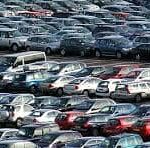

 · Cautions NCS Against Sacrificing Trade Facilitation For Revenue Generation
· Cautions NCS Against Sacrificing Trade Facilitation For Revenue Generation
Stakeholders in the nation’s maritime industry, especially importers, vehicle dealers, as well as clearing and forwarding agents have canvassed uniformity in the clearance of vehicles, just as they cautioned officials of the Nigeria Customs Service (NCS) against sacrificing trade facilitation on the altar of increased revenue generation.
The stakeholders stated this in a communiqué signed by President of the Maritime Journalists Association of Nigeria (MAJAN), Ray Ogochukwu, Secretary-General, Jerry Aguigbo and Chairman of The Powerful Pen (TPP) Media Chapel of the Nigeria Union of Journalists (NUJ), Udeme Clement and issued at the of end a roundtable organised by MAJAN on VIN Valuation held on June 28, 2022, in Lagos.
Before organising the roundtable, the group stated that it was disturbed by complaints of freight forwarders, importers and customs officials on the challenges and workability of the newly introduced vehicle duty assessment (VIN) Valuation regime, which it said informed it decided to invite the stakeholders for a brainstorming session.
The forum provided an avenue to understand the workings, challenges and implications of the policy on the nation’s economy and also proffered solutions to the challenges in the sector.
Representatives of the National Association of Government Approved Freight Forwarders (NAGAFF), Association of Nigerian Licensed Customs Agents (ANLCA), African Association of Professional Freight Forwarders and Logistics in Nigeria (APFFLON), National Council of Managing Directors of Licensed Customs Agents (NCMDLCA) and maritime journalists, participated in the discussion.
They stressed that the NCS should not sacrifice trade facilitation on the altar of revenue generation, a development they blamed on the hasty introduction of a policy for which it was not adequately prepared.
They, however, commended the Apapa Customs Area Controller (CAC), Comptroller Kunle Oloyode, for introducing the code system in the clearance of non-standard vehicles, adding that with the system, popped-up codes were uploaded into a direct portal for an immediate response without physical contact, while urging other to emulate his initiative.
“We call upon the NCS to go back to the drawing board to harmonise its operations in ensuring that the non-standard vehicles are accommodated in the valuation portal. The NCS should provide valuation charts and data for all categories of vehicles as a guide for all and sundry to prevent people from shortchanging the system.
“Customs should make every effort to accommodate every vehicle into its port. In the interim, the NCS should operate the VIN valuation and manual systems side by side until everything is harmonised for seamless operations.
“The NCS should stick to the 12 years age limit for vehicles it canvassed before introducing the scheme instead of the nine years presently obtainable. A situation where the duty of Gulf, Toyota Corolla and Matrix has increased from between N300,000 and N500,000 to between N1 million and N1.3 million is unacceptable as it has made vehicles unaffordable for ordinary Nigerians,” part of the communiqué reads.
The stakeholders enjoined Vehicle Registration (V-REG) firm to be accessible and put its house in order by upgrading its system with a view to meeting the required needs of customers.
“Henceforth, the Federal Government should ensure that only career Customs officers are appointed as Comptrollers-General of the Service to avoid unnecessary trade bottlenecks in the system, which experienced career officers would not infuse into the system,” it added.
Participants were unanimous in expressing their displeasure that the policy was hurriedly implemented by the NCS without the statutory 90 days’ notice given to stakeholders before new policies are introduced in the system.
They stated as follows: “That the NCS failed to keep to the earlier advertised assurance of a test-run of the policy in one port before making it universal. As a result, there was no room for the fine-tuning of noticed hitches.
“That the major problem with VIN-valuation is the clearance of non-standard vehicles, whose data and history are not captured in Customs valuation portal. As a result, owners of such vehicles or their agents are compelled to interface with Customs officers, many of whom are using such opportunities to exploit them. For standard vehicles, those with 17-digit numbers, though the duty is still viewed a bit high their clearance can be rated with a 90 per cent pass mark.
“That it was however disclosed that some of the standard automobiles like Mercedes, M Class, some brands of Toyota, BMW and Lexus with 17 digits, are still not captured in the VIN-valuation portal. This has resulted in their clearance still being subject of negotiation between importers and Customs officials resulting to abuses and compromises.”
They also pointed out that there was no database or chart for standard and non-standard VIN, a development that does not help freight forwarders or importers to plan ahead for the clearance of vehicles.
Expressing concern over the huge valuation disparity between vehicles from Asia and those from America, the forum condemned the reduction of the age limit of imported vehicles to nine years instead of the 12 years, which the Customs canvassed during stakeholders’ sensitisation meetings.
Insisting that the NCS had assured that it would not go back to the drawing board to fine-tune the system, they said the development became a cause for concern, as the anomalies were forcing everybody to lose out.
“Due to the confusion in the system, avoidable delays were encountered by vehicle owners with the attendant demurrage charges which have made clearing costs so high that these automobiles are now abandoned in the ports by their owners.
“So far there has been no reprieve from any quarter as to assuaging the accumulated demurrage encountered by importers for a problem not caused by them. Consequently, while the terminals are congested with abandoned vehicles, no revenue accruing to their operators; Customs is losing revenue as output is on a downward journey,” the communiqué added.
Participants further lamented that the NSC had failed to factor the yearly 10 per cent depreciation value of vehicles into the VIN valuation System, the outcome of which is the present high cost of clearing.
On their part, freight forwarders frowned on the abysmal performance of the V-REG, which office, they said was far removed from its operational base, with no verifiable address, adding that the company’s irregular network has been making it difficult for people to make requisite payments with the resultant delays.
 The New Experience Newspapers Online News Indepth, Analysis and More
The New Experience Newspapers Online News Indepth, Analysis and More
